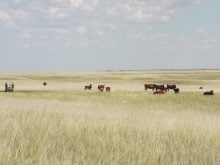RED DEER — Converting a large hog operation from a gestation crate system to loose sow housing was a major undertaking for Mountain Vista Farm but the renovation has been advantageous.
Owned by Sunterra Farms, the company decided the time was right to convert the farm built in 1997.
Farm manager Duane Molton said the company talked with other producers to see what worked.
The renovation was constrained because they wanted to retain the original feed lines, trough drinkers, electrical, ventilation and manure management systems.
Read Also

Manitoba extends Crown land rent freeze
Manitoba government links the continued rental rate freeze on grazing and forage leases to economic and environmental challenges facing the industry
The work started in June of 2017 with the pigs kept in the barn during construction.
“It is really important to start with a few pens to see what works so you can adjust your design before you go too far,” he said at the Red Deer swine technology workshop held last fall.
There are about 15 sows per pen and each has a feeding space.
Some crates were retained for the culls, bullies or those that did not fit into the pen system as well.
The advantages so far are a lower stillbirth rate, lower overall mortality and increased sow comfort.
Conversely, they have lost the ability to individually feed sows and feeding competition has increased among sows.
An open system is more labour intensive and requires a higher level of animal management because more attention must be paid to details.















